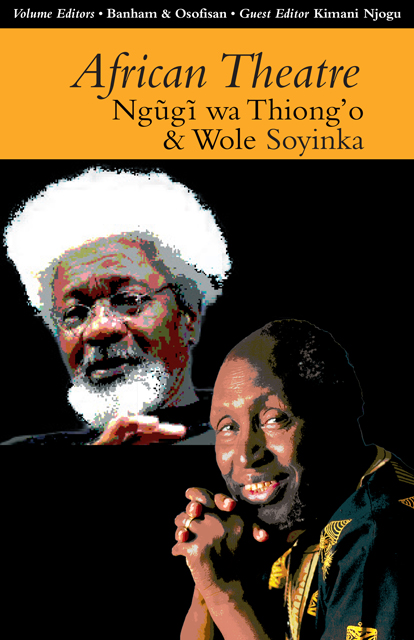Book contents
- Frontmatter
- Contents
- Notes on Contributors
- Obituary of Pat Amadu Maddy
- Introduction
- Reading & Performing African Drama: How Wole Soyinka & Ngũgĩ wa Thiong’o influenced my work
- Ayan Contra Ujamaa: Soyinka & Ngũgĩ as theatre theorists
- Encounters with Soyinka
- Encounters with Ngugi
- Wole Soyinka & Ngũgĩ wa Thiong’o: Plays in Production
- The Making of The Trial of Dedan Kĩmathi by Ngũgĩ wa Thiong’o & Mĩcere Gĩthae Mũgo at the University of California, Irvine: A personal reflection
- Playscript: A Rain of Stones
- Book Reviews
Wole Soyinka & Ngũgĩ wa Thiong’o: Plays in Production
Published online by Cambridge University Press: 23 February 2023
- Frontmatter
- Contents
- Notes on Contributors
- Obituary of Pat Amadu Maddy
- Introduction
- Reading & Performing African Drama: How Wole Soyinka & Ngũgĩ wa Thiong’o influenced my work
- Ayan Contra Ujamaa: Soyinka & Ngũgĩ as theatre theorists
- Encounters with Soyinka
- Encounters with Ngugi
- Wole Soyinka & Ngũgĩ wa Thiong’o: Plays in Production
- The Making of The Trial of Dedan Kĩmathi by Ngũgĩ wa Thiong’o & Mĩcere Gĩthae Mũgo at the University of California, Irvine: A personal reflection
- Playscript: A Rain of Stones
- Book Reviews
Summary
Two giants of African theatre, Wole Soyinka and Ngũgĩ wa Thiong’o, have been involved in very different kinds of work, and the differences are apparent in the production histories of their work that follows. To keep the Soyinka part of this chapter within manageable proportions, only one of his plays is considered here. It is, appropriately, a well-known work, and one that has been given both relatively modest and extensively reviewed ‘main stage’ productions: Death and the King’s Horseman (1976). The Ngũgĩ part of this chapter, prepared with limited resources and under pressure of time, seeks to suggest the scope of his theatre work over the whole of his career. It draws attention to the analyses of the play-making processes that he has been involved with and makes very direct links with several of the articles in this volume.
Death and the King’s Horseman, 1976. A play in production: an extract from a longer playography by James Gibbs
Written in Cambridge when Soyinka was in residence at Churchill College (September 1973), Horseman was given a ‘read through’ there. It has become Soyinka’s most widely studied play, but probably not his most widely performed. (That title must, I think, go to The Trials of Brother Jero, 1964). The Cambridge matrix was significant for the play’s genesis, and in Myth, Literature and the African World Soyinka has written about the ‘colonial’ attitudes he encountered that resulted in him delivering his lectures in the Anthropology Department! (The study of mankind may be man, but the study of Africans is anthropology.) Soyinka has also spoken of the influence on him of the bust of Churchill in the college where he was accommodated. I take that reference – see ‘Who’s Afraid of Elesin Oba?’ and Orisha Liberates the Mind, (1992: 15-16) – to suggest that the bust prompted consideration of issues of leadership and determination.
Although Cambridge and Churchill may have ‘triggered’ the play, the story or ‘plot’ is also important. Soyinka had been aware of the episode around which the play revolves – the interrupted ritual suicide in Oyo – for more than a decade. It had, for example, been brought to his attention by Ulli Beier in 1960, when Beier put it forward as providing a resonant episode for a play to mark Nigeria’s independence.
- Type
- Chapter
- Information
- African Theatre 13Ngugi wa Thiong'o and Wole Soyinka, pp. 60 - 76Publisher: Boydell & BrewerPrint publication year: 2014

